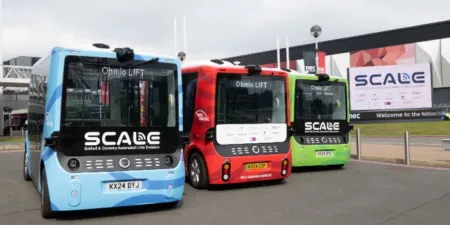Continuing its ambition to become one of the world’s leading centers for the development and deployment of self-driving and smart urban mobility technologies, Singapore is to trial autonomous buses.
The city-state’s Land Transport Authority (LTA) has signed agreements with the Nanyang Technological University (NTU) to collaborate on a series of transport research projects, with the partners conducting first-of-its-kind trials for two fully-autonomous 40ft-long (12m) buses.
These projects will be conducted under the ambit of the LTA-NTU Transport Research Center (TRC), which was set up in November 2015 to conduct research and technical trials for innovative technologies in the transport industry. As part of LTA’s Request for Information (RFI) on autonomous mobility concepts issued in June 2015, LTA will partner with the Energy Research Institute @ NTU (ERI@N) to develop autonomous bus technologies, which includes conducting a self-driving bus trial for fixed and scheduled services for intra- and inter-town travel.
Under this collaboration, ERI@N will test and develop its self-driving vehicle technology with two electric hybrid buses. As one of the first research institutions to trial a self-driving electric shuttle within its campus at CleanTech Park, which it has carried out since 2013 NTU has built up strong research capabilities in the development of electric and autonomous vehicle technologies.
It is also leading key research testbeds and facilities such as the Center of Excellence for Testing & Research of AVs – NTU (CETRAN), which was established in August 2016, and the NTU-NXP Smart Mobility Testbed. ERI@N aims to outfit existing buses with a suite of intelligent sensors and develop an autonomous system that can effectively navigate Singapore’s local road traffic and climate conditions, enabling the self-driving buses to operate safely and efficiently.
The roads between NTU and CleanTech Park, which is located within Jurong Innovation District, have been earmarked as potential test routes for the self-driving bus trial. It is envisaged that the trial could be extended in future to ferry commuters from NTU and CleanTech Park to Pioneer MRT station. The self-driving buses will feature opportunistic charging technology that will enable them to be recharged when they stop at a bus depot or bus stops.
This latest collaboration follows the partnerships inked by LTA with Delphi and nuTonomy in August to conduct autonomous mobility-on-demand trials in the One-North testbed. The bus trial and the AV projects are among more than 20 research projects being conducted by the LTA-NTU TRC on specific focus areas, such as active mobility and self-driving vehicle technology. NTU is also working with various leading industry partners including bus manufacturers and companies that produce innovative autonomous sensors.
Professor Lam Khin Yong, NTU chief of staff and vice president of research, said, “Our deep expertise in sustainability technologies, engineering and industry collaboration has contributed toward developing new solutions for public transportation, such as first- and-last-mile autonomous shuttles and buses. Current efforts worldwide have been focused on cars, so this autonomous bus trial is the first-of-its-kind in Singapore that will aim to improve road safety, reduce vehicle congestion, alleviate pollution, and address manpower challenges.”




